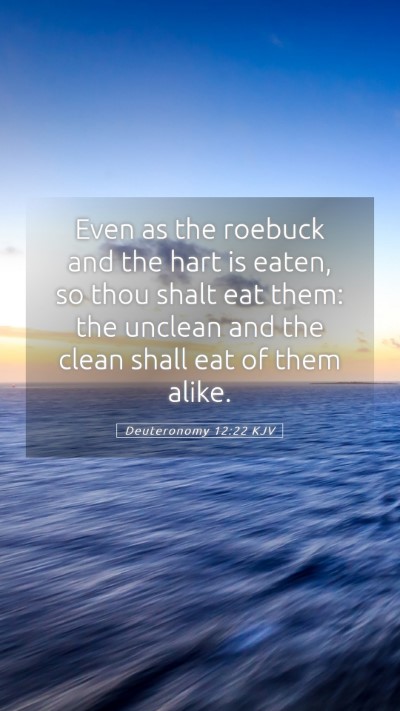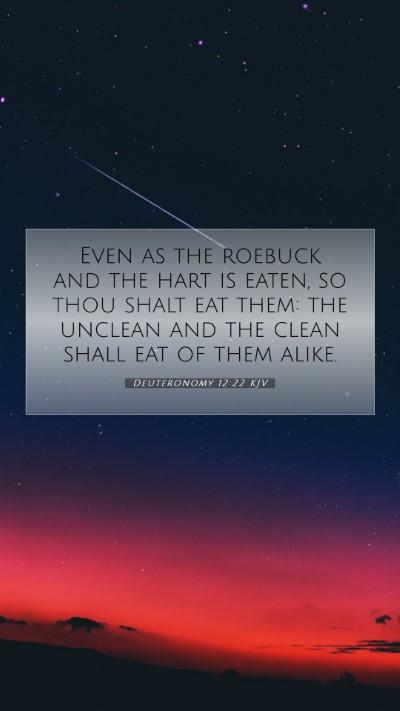Bible Verse Commentary on Deuteronomy 12:22
The verse Deuteronomy 12:22 states: "Even as the roebuck and the hart is eaten, so thou shalt eat them: the unclean and the clean shall eat of them alike, as of the roebuck and as of the hart." This verse addresses the dietary regulations and the permissibility of eating certain animals, focusing on how the distinction between clean and unclean does not prevent enjoyment in certain circumstances.
Understanding the Context
In Deuteronomy, Moses instructs the Israelites on how to live in the Promised Land. This chapter deals with the proper worship of God, the places where sacrifices should be made, and dietary laws. The surrounding verses build up the idea that being clean or unclean is significant in the context of worship and communal life.
Insights from Public Domain Commentaries
- Matthew Henry: Henry emphasizes the equality in the consumption of certain animals, pointing out that both the clean and unclean are permitted to eat these animals. This demonstrates a shift from strict separation to inclusivity in certain aspects of civic and spiritual life among the Israelites. He notes that this verse illustrates God’s provision and the celebration of His blessings.
- Albert Barnes: Barnes explains that this verse signifies God's allowance for the Israelites to consume clean animals even in less restrictive settings. He argues that this is meant to assure the faithful that they could enjoy provisions without fear of ceremonial defilement during certain occasions. It highlights God’s generous nature and the freedom given to His people regarding dietary laws.
- Adam Clarke: Clarke interprets the roebuck and hart as representing God's provision for sustenance. He discusses the overarching theme of grace present in the allowance of both clean and unclean individuals to partake in the bounty of creation, suggesting a theological undercurrent of community and fellowship.
Theological Implications
This verse serves a dual purpose. On one hand, it reaffirms God's laws regarding purity and cleanliness; on the other, it underscores the notion of community acceptance and the equal treatment of individuals before God. The distinction between clean and unclean becomes less rigid in practice, promoting a spirit of unity among the worshippers.
Bible Study Insights
When studying this verse, it's critical to consider:
- The historical context of ancient dietary laws.
- The spiritual significance of clean and unclean distinctions in relation to communal worship.
- The notion of God’s provision that goes beyond ceremonial restrictions.
Application of the Verse
For modern readers, this verse prompts us to reflect on how we incorporate communal aspects of faith into our spiritual lives. It encourages believers to appreciate God’s blessings regardless of their backgrounds or cleanliness, promoting inclusivity within congregational settings.
Cross References
- Leviticus 11:4-7: Discusses dietary laws in greater detail, specifically identifying clean and unclean animals.
- Romans 14:14: Discusses the idea of clean and unclean foods concerning Christian freedom and conscience.
- 1 Timothy 4:4-5: Affirms that everything God created is good and should be received with thanksgiving.
Conclusion
In summary, Deuteronomy 12:22 offers a rich understanding of dietary laws alongside a broader spiritual message of inclusion and community under God’s providence. Engaging deeply with this verse allows for greater insights into Scripture as a whole, encouraging Christians to seek the intent behind God’s laws and His desire for fellowship among believers.


